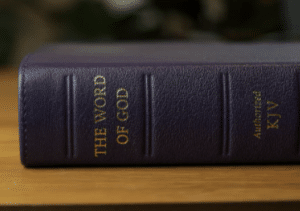 A common argument among some King James Onlyists is to claim that Psalm 12:6 affirms the King James Bible as the most pure and correct Bible in the English language because it is the seventh English Bible translation and the Psalm says that the pure words of the Lord are “purified seven times.” There are numerous problems with this interpretation and, even if the Psalm did mean what the King James Onlyist claims, it would not actually affirm the KJV we have today (or any KJV at all, really). Let’s take a look.
A common argument among some King James Onlyists is to claim that Psalm 12:6 affirms the King James Bible as the most pure and correct Bible in the English language because it is the seventh English Bible translation and the Psalm says that the pure words of the Lord are “purified seven times.” There are numerous problems with this interpretation and, even if the Psalm did mean what the King James Onlyist claims, it would not actually affirm the KJV we have today (or any KJV at all, really). Let’s take a look.
“Purified seven times” in context
The verse from which King James Onlyists derive this argument reads:
“The words of the Lord are pure words: as silver tried in a furnace of earth, purified seven times,” (Psalm 12:6).
First of all, it is important to note that, at the time this Psalm was written, God’s words were already pure. Whatever one takes the “purified seven times” to mean, it was already past tense in the time of King David. It was not awaiting a process of English Bible translation 2,500 years later. More importantly, the term “purified seven times” is describing the silver, not God’s words. God’s words did not start off tainted with falsehood or filth and need to be purified many times before they could finally become pure words. God’s words were always pure. The psalmist is comparing God’s words to very pure silver. By saying that the silver had been purified seven times in the furnace, he is emphasizing that he means silver that is utterly and completely pure, without the slightest hint of dross. The analogy has nothing to do with Bible translations or with purifying God’s already pure and perfect words.
But what if “purified seven times” did mean that…
But lets’ just say, hypothetically, that this really was a prophecy about English Bible translations, and it did mean to say that the seventh translation was the purest and most perfect (the Psalm obviously has nothing to do with that, but let’s just roll with it for a moment and see where it goes). What translation would that leave us with? The typical King James Only argument goes something like this:
- Tyndale Bible (1526)
- Coverdale Bible (1535)
- Matthew Bible (1537)
- Great Bible (1539)
- Geneva Bible (1560)
- Bishop’s Bible (1568)
- King James Bible (1611)
And there you have it! Refined seven times, the pure and perfect English Bible is the 1611 King James Bible! Of course, that would mean that the purifying was finished in 1611, so we should be using a Bible identical to one of the editions printed that year. I will leave the King James Onlyists to tell us which one, but whatever they pick, it certainly will differ from the KJV Bibles you might buy at the store today. Bibles sold as the KJV today are substantially identical to the 1769 Blaney revision of the KJV, the last and most important of several post-1611 revisions done to the wording of this revered translation. Of course, if the King James Version was already perfectly purified in 1611, those “revisions” are actually perversions of the text; any changes would necessarily be impurities! Thus, King James Onlyists are, on this interpretation of Psalm 12:6, using the wrong Bible! They have a corrupted KJV, diluted by that villain Benjamin Blaney!
But wait, there’s more!
All of this assumes, of course, that the English Bible begins with Tyndale. But, in fact, the first complete English Bible was the 14th-century Wycliffe Bible. Thus, the seventh is actually the Bishop’s Bible! We should all be Bishop’s Bible Onlyists! The KJV is the sad and unnecessary eighth Bible. No, wait! We forgot about the 1539 Taverner’s Bible! That makes the Geneva Bible the perfectly pure seventh edition! Oh no, hold on, William Tyndale actually never published the entire Bible. He only printed the New Testament, the Pentateuch, and the Book of Jonah before he died. Should that still count? Maybe we’re Bishop’s Bible Onlyists again? O maybe we count the parts Tyndale finished. So, for the New Testament, the five books of Moses, and Jonah, the Geneva Bible is the perfectly pure seventh Bible, but the rest of the Old Testament wasn’t pure until the Bishop’s Bible. Now, do we use the 1557 Geneva New Testament or can we use the revised version from the complete 1560 Geneva Bible? Or wait, since Tyndale published a substantially revised version of His new Testament later in life, does that mean we should actually be using the New Testament from the Great Bible? Am I doing this right?
Conclusion
When we actually look at the data, today’s KJV is in no sense the seventh Bible in the English language, and that doesn’t matter. Neither Psalm 12:6 nor anything else in the Bible attaches any special significance to the seventh translation into English. God’s words are already pure in any language into which they are translated, and they don’t need to be further purified seven times. God’s word, in any honest Christian translation, can be fully trusted.





